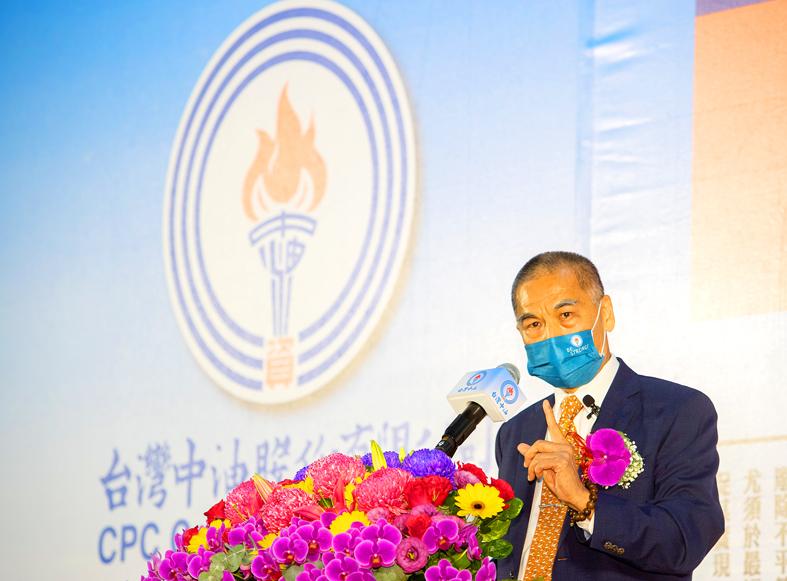State-owned fuel supplier CPC Corp, Taiwan (CPC, 台灣中油) has racked up significant losses since late last year, while stuck between high natural gas costs and a government-imposed freeze on raising end-user prices to stem inflationary pressures.
The mounting losses, which appear to be unsustainable, have cast doubt on CPC’s ability to make the investment called for in the initial phase of the government’s pledge to reach net-zero carbon emissions by 2050, and its new chairman said raising prices might be the only solution.
Speaking on Tuesday, shortly after taking over as CPC chairman, Lee Shun-chin (李順欽) said the company’s losses totaled NT$30.5 billion (US$1.05 billion) in the first quarter and would rise to NT$65 billion by the end of the month if domestic oil and natural gas prices remained unchanged.

Photo: CNA
The NT$65 billion estimate represents half of the company’s paid-in capital, and Lee said several proposals to improve the company’s financial structure have been floated and would be presented to its board at a meeting next month.
One solution is to include imported energy costs in domestic prices, Lee said, but that would be “contingent on approval from the government.”
The government has required CPC to freeze natural gas prices for retail users since January last year, despite a major increase in the global price of liquefied natural gas, resulting in a loss of NT$43.4 billion for last year, the company’s highest in 13 years.
The government gave the firm a small reprieve last month, when it allowed CPC to raise natural gas prices to power generation and electricity distribution businesses, such as Taiwan Power Co (Taipower, 台電), by 10 percent.
Prices for residential and most industrial users remained the same, and the NT$51.7 billion in higher liquefied natural gas costs the company had to eat in the first quarter was already half of the NT$104.8 billion in increased costs it absorbed last year.
“The 10 percent increase was made with the consent of the Ministry of Economic Affairs,” because CPC only has the discretion to raise prices by 3 percent per month, but no more than 6 percent every quarter, Lee was quoted as saying in local media.
Even with the latest price increase, CPC sells natural gas to Taipower and other power generation and electricity distribution businesses at between NT$12 and NT$13 per cubic meter, lower than its cost of NT$20 per cubic meter, Lee said.
Because CPC and Taipower have not passed on the higher costs to end users or had limited price increases, inflation in Taiwan was a relatively low 2.81 percent in the first quarter, compared with 5.8 percent in January and 6.3 percent in February in Organisation for Economic Co-operation and Development countries excluding Turkey.
That would change if Lee is able to pass on more of CPC’s rising prices to consumers.
If he cannot, and the losses continue to mount, it would put the government “in a very disadvantageous position” on new energy development to attain net-zero carbon emissions by 2050, Tamkang University economics professor Liao Huei-chu (廖惠珠) was cited as saying by the Chinese-language China Times.
CPC might withhold investing in “less-urgent” renewable energy as has been the case with Taipower, which put off a power grid project because it was losing money, Liao said.

NEW IDENTITY: Known for its software, India has expanded into hardware, with its semiconductor industry growing from US$38bn in 2023 to US$45bn to US$50bn India on Saturday inaugurated its first semiconductor assembly and test facility, a milestone in the government’s push to reduce dependence on foreign chipmakers and stake a claim in a sector dominated by China. Indian Prime Minister Narendra Modi opened US firm Micron Technology Inc’s semiconductor assembly, test and packaging unit in his home state of Gujarat, hailing the “dawn of a new era” for India’s technology ambitions. “When young Indians look back in the future, they will see this decade as the turning point in our tech future,” Modi told the event, which was broadcast on his YouTube channel. The plant would convert

‘SEISMIC SHIFT’: The researcher forecast there would be about 1.1 billion mobile shipments this year, down from 1.26 billion the prior year and erasing years of gains The global smartphone market is expected to contract 12.9 percent this year due to the unprecedented memorychip shortage, marking “a crisis like no other,” researcher International Data Corp (IDC) said. The new forecast, a dramatic revision down from earlier estimates, gives the latest accounting of the ongoing memory crunch that is affecting every corner of the electronics industry. The demand for advanced memory to power artificial intelligence (AI) tasks has drained global supply until well into next year and jeopardizes the business model of many smartphone makers. IDC forecast about 1.1 billion mobile shipments this year, down from 1.26 billion the prior

People stand in a Pokemon store in Tokyo on Thursday. One of the world highest-grossing franchises is celebrated its 30th anniversary yesterday.

Zimbabwe’s ban on raw lithium exports is forcing Chinese miners to rethink their strategy, speeding up plans to process the metal locally instead of shipping it to China’s vast rechargeable battery industry. The country is Africa’s largest lithium producer and has one of the world’s largest reserves, according to the US Geological Survey (USGS). Zimbabwe already banned the export of lithium ore in 2022 and last year announced it would halt exports of lithium concentrates from January next year. However, on Wednesday it imposed the ban with immediate effect, leaving unclear what the lithium mining sector would do in the